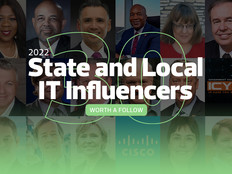Washington CIO: Citizens Expect Government to Act Like Google
Washington state CIO Michael Cockrill believes citizens should experience as much — or as little — of government as they want.
Cockrill refers to this type of citizen-to-government interaction as personalized government. “It’s really all about, how do you give your citizens as much of government as they need and want, but no more?” Cockrill said last week at Beyond the Beltway, in northern Virginia. “The consumerization of IT, the trend of citizens expecting their government to act like Amazon and Google and Microsoft, is putting a huge amount of pressure on us to be able to respond to our customers’ needs.”
To have a personalized government, state and local agencies must embrace the big three: They must be mobile, modern and secure, Cockrill explained.
In Washington, optimizing the state’s existing infrastructure will play a key role in creating a personalized experience for citizens. Cockrill’s office recently identified 1,983 unique software systems, across 44 executive branch agencies. More than a third of those systems were categorized as being legacy systems.
The greatest duplication was among systems used for authorization purposes; determination of eligibility for benefits or programs; and case management. Those systems were prioritized as most needing modernization and represent the biggest opportunity to consolidate more than a dozen different systems down to two or three, Cockrill said.
Innovation is another pillar of Cockrill’s approach to serving citizens better. The state is working on open data initiatives and agile methods for solving challenging issues. Recently, the state received a Freedom of Information Act request for every email generated by state employees in the last two years.
“How hard could that be,” he joked. “We’re looking for innovative ways to solve problems like that.”
It’s About People, Not Programs
In Michigan, much of the state’s strategic plan is focused on changing the workforce culture and realizing it’s about the people, not the programs, said Rodney Davenport, the state’s chief technology officer, who also spoke at the conference. Information technology plays a major role in fulfilling that vision.
Gov. Rick Snyder expressed similar sentiments in his January State of the State speech:
“What we have done is sliced and diced people into programs. We have moved away from treating them as real people. In fact, in some cases we have taken some of their dignity away as a person by putting them through so many programs. The other problem with all of these programs is what we have done. Quite often we are addressing systems, we are not addressing real causes; we are actually facilitating dependency on government.”
Davenport said his team is trying to make government services more accessible via mobile devices and the web. The state is focused on making citizens more aware of what services are available to help them.
Ohio Tackles Integrated Eligibility
For the past 18 months, Ohio has been expanding integrated eligibility projects to proactively inform citizens of services they qualify for and simplify the enrollment process, said Spencer Wood, the state’s deputy CIO and chief operations officer.
“Were trying to make sure that people are getting the services they need,” he said during the conference.
In Ohio, if you are a disabled veteran over the age of 60 and are addicted to drugs or alcohol, there are potentially three to five agencies you could go to for assistance. All those agencies have different qualification requirements. To simplify things, all health and human services agencies were collapsed under one cabinet, and they are now doing integrated eligibility.
“You go to one place, you become eligible for everything,” Wood said. “It has worked out really well.”









